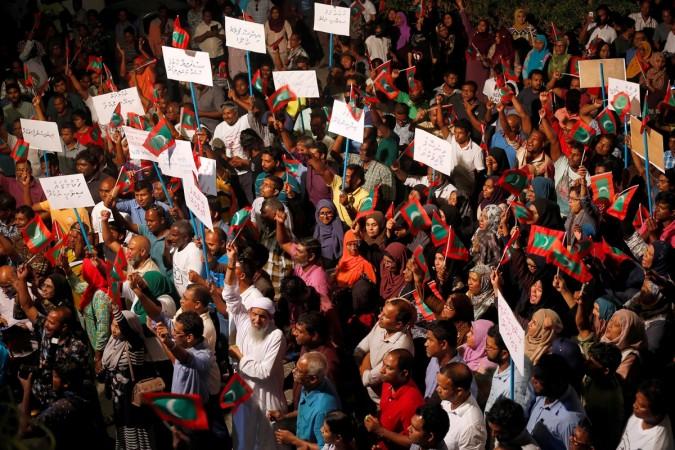
The midnight telephone call from US President Donald Trump, coupled with a public appeal earlier by exiled Maldives leader Mohamad Nasheed to send troops to the Maldives, would be tempting for the Indian government to showcase its prowess intervening in the tiny island nation.
The State Emergency, curtailing the Constitutional rights and imprisoning political opponents and even Supreme Court judges, seeking the intervention of China, Pakistan, and Saudi Arabia -- all hint at the current regime's desperation to hold on to power irrespective of the public support. To pre-empt international intervention, Maldives President Abdulla Yameen has even weighed the option of early elections and going by 2013 experience, the outcome will be engineered again to be in his favor.
As both judicial and political solutions are tamed to be null and void, military intervention seems inevitable but Maldives is not Mozambique as exiled former president Nasheed does not enjoy the support of the nation's small army which is primarily tasked to reinforce the local police and ensure security in the exclusive economic zone (2008) from the sea pirates and smugglers.
The external support is unavoidable as in 1988 too New Delhi had to rush its Navy to counter some Sri Lankan mercenaries, at the invitation of the then President Maumoon Gayoom. But the scenario has changed ever since and now the government of Maldives believes India is sympathetic to Nasheed and his supporters.
To avoid any Sri Lanka-style intervention by India, Maldives President Yameen has already cleared the path for the Chinese to own some islands and given project contracts to build infrastructure, so Beijing too gets involved in the embroglio, if required. He has also sent emissaries to China, Pakistan and Saudi Arabia to send the signal to India that the present government is not as timid as perceived.
But for India, Maldives has become an unexpected challenge in the Indian Ocean with the growing Chinese presence and expanding financial interests in the tourist-driven economy. But the initial reluctance from India might change soon with the telephonic call from President Trump. Or else, the State Emergency might surely trick India to respond quickly to the appeals for intervention.
But before venturing, India should ponder its past mistakes too.
To recall the 1987 Sri Lankan adventure, the then Prime Minister Rajiv Gandhi got both the Tamil Tiger rebels and the Jayawardene government to peace talks and finally signed the pact that was later claimed as forced upon them by LTTE supremo Velupillai Prabhakaran. This was perhaps the first diplomatic blunder by India in the Indian Ocean politics.
When Rajiv Gandhi packed off these leaders along with the Indian peacekeeping troops, the LTTE rebels turned hostile and the Sri Lankan army nurtured grudge against India that they never hesitated to show it to him physically.
Indian troops ended up fighting the rebels whom it wanted to protect initially and was caught in the midst of alleged human rights violations. The three-year saga has taught India several lessons as Rajiv Gandhi himself was assassinated by the LTTE rebels during the 1992 elections to prevent him from becoming prime minister again. With harsh lessons learnt, India has since preferred to remain an outside observer of the conflict in Sri Lanka.
However, some hawkish observers may vie for a 'Great India' stature by pushing the Modi government to venture into the Indian Ocean again. Both defence minister Nirmala Sitharaman and External Affairs minister Sushma Swaraj may genuinely consider countering the fast-emerging China factor in Maldives and protect India's strategic and financial interests in the island nation.
Even domestic political compulsions are overwhelmingly in favor of Narendra Modi's ruling
Bharatiya Janata Party to pitch in for a military intervention in the Maldives as it would 'Make India
Great' in the eyes of the world. With the upcoming general elections next year, BJP would
certainly fall for the bait.
Since the Dokla border issue with China has been backrolled to talks level now, an offshore offensive in the Maldives would do the trick for the ruling party. But the ramifications loom large as it may bring all anti-India forces together under the umbrella of Beijing.













